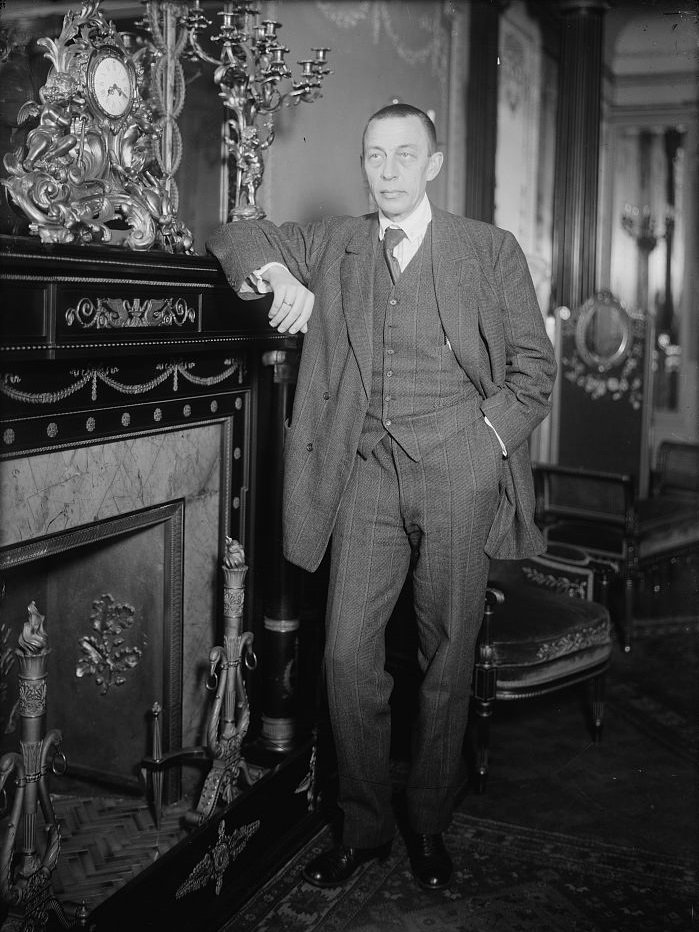- History

When we talk today about a globalised world, we must not think that the people in the past always remained in their native environment. Russian composers of the late 19th and early 20th centuries, at any rate, looked for exchange with the Western musical world. Sometimes they were fleeing the looming revolution, but above all, they were driven by curiosity and the desire for intercultural dialogue.
It almost seems as if the master of the house has just gone out for a short while. The Russian newspaper is still open on the table, the stool is pushed forward against the black grand piano, a Steinway, a gift from the house ... This is what a photograph shows. But the master of the house will not return. It is 1939. Due to the war, Sergei Rachmaninoff leaves Europe for the USA. Four years later, his life's journey will come to an end in Beverly Hills.
The great departure
If GPS movement profiles had existed in the 19th century, we would have been able to detect increased migration from Eastern to Western Europe. Frédéric Chopin, for example, who, after attempts in Vienna and his departure from Warsaw, finally chose Paris as his adopted home. Michael Glinka, who is often called the father of Russian classical music, breathed Italian air for three years, met Bellini and Donizetti, and then studied with the Berlin contrapuntalist Siegfried Dehn before returning to Russia. In the mid-1840s Glinka travelled extensively in Spain and composed two Spanish Overtures under this influence. A penchant for Western European influences can also be found in Tchaikovsky's work – except that, as with Glinka, this never led to a definitive break with his Russian homeland.
It was only towards the end of the 19th century and in the early 20th century that Russian musicians began to emigrate to the West, under changing political circumstances and continuing to the present day, from Stravinsky and Rachmaninoff to Alfred Schnittke and Sofia Gubaidulina. The reasons are complex, ranging from the state repression of the Tsarist and Stalinist periods to economic reasons. This does not only concern high ranking composers, but also musicians such as Nikolaj Medtner, Paul Juon (Russian with Swiss roots) and Vladimir Ivanovich Rebikov, who finally returned to Moscow after years in Western Europe.
Diaghilev and the aftermath
The Russia-Western Europe axis gained strength when Sergei Diaghilev organised exhibitions of old and new Russian art in Paris from 1904 onwards. These were followed from 1907 by concerts with a focus on Russian music. In the same year, he presented two concerts conducted by Nikolai Rimsky-Korsakov, who had already made a successful guest appearance at the 1899 World's Fair in Paris. Diaghilev then changed professions: he became impresario of the Ballets Russes, which he founded. He first engaged the composer Igor Stravinsky to write the music for the ballet The Firebird. Stravinsky felt that Saint Petersburg, where he lived, was constricting, and was happy to escape Russia and showcase himself on the international stage.
Paris became something of a melting pot for musicians from Eastern Europe. Under the name École de Paris, composers from five countries, including Bohuslav Martinů from the Czech Republic, Alexandre Tansman from Poland and Alexander Nikolayevich Cherepnin from Russia, came together in friendship. Between the two world wars, an increasing number of Polish composers lived in Paris, including Szymon Laks. They formed the group the Jeunes musiciens polonais.
New destinations
The USA also became a focus of attention. When Sergei Prokofiev left his Russian homeland for the New World in 1918, he was not a political refugee, but simply wanted to try his luck. His years in the United States ended in financial (and artistic) disaster, and so he returned to Europe in 1920 – to France, where, except for an interlude in 1922/23 in the Bavarian town of Ettal, he remained until the 1930s. In 1936, he finally returned to the Soviet Union.
The balance was also shifting within Western Europe. While Vienna and Leipzig were considered musical strongholds in the mid-19th century – especially in the field of training – France (and thus Paris) became increasingly important from the 1890s onwards. French composers such as Gabriel Fauré, César Franck, Vincent d’Indy and Ernest Chauson develop alternatives to the German-influenced musical tradition, towards a national style of their own.
In this respect, the Russian composers in Paris were meeting kindred spirits; after all, they have just come through the struggle to develop their own Russian national music. As a result, this cultural “nation-building” developed into an increasingly international amalgam that opened the door to completely new kinds of aesthetic developments.